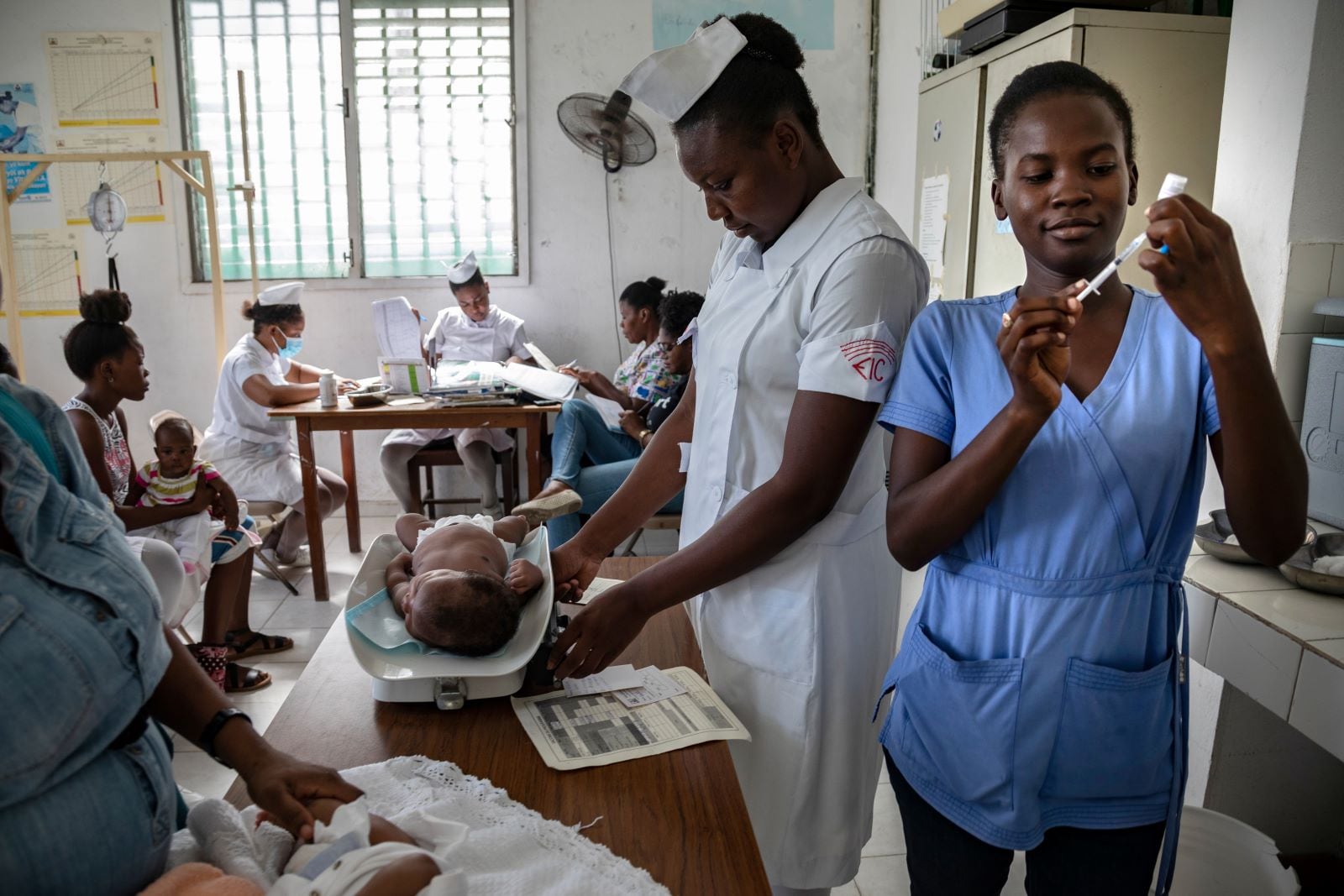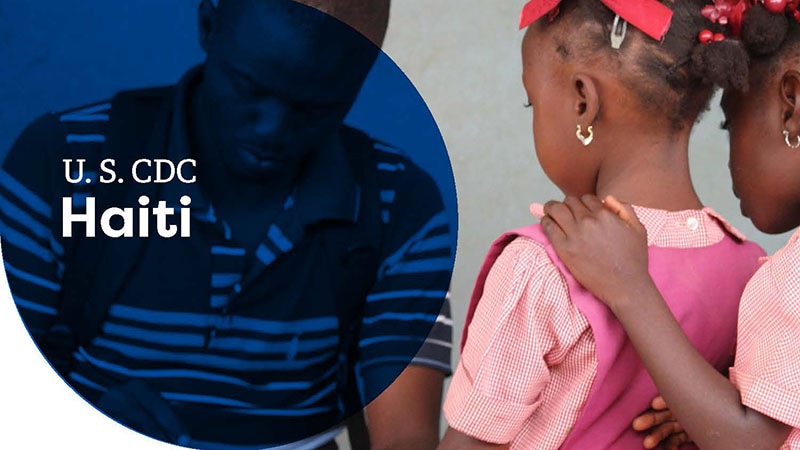At a glance
CDC works closely with Haiti's Ministry of Public Health and Population (MSPP) and other partners to build effective public health collaboration and partnerships, which strengthen the country's core public health capabilities: data and surveillance, laboratory capacity, workforce and institutions, prevention and response, innovation and research, and policy, communications, and diplomacy.

Overview
CDC established an office in Haiti in 2002. CDC Haiti works closely with the Ministry of Public Health and Population (MSPP) and partner organizations to detect, prevent and control infectious disease outbreaks and build and strengthen the country's core public health capabilities. These include data and surveillance, laboratory capacity, workforce and institutions, prevention and response, innovation and research, and policy, communications, and diplomacy. CDC's work aims to protect the health of our nations and public health around the world. CDC Haiti also supports HIV and tuberculosis (TB), cholera, and malaria response, and immunization.
Global health security
CDC’s increased support to MSPP has resulted in substantial advances in health security and public health system strengthening in Haiti. CDC's global health security efforts help improve the country's ability to prevent, detect, and respond to infectious disease outbreaks. These efforts help Haiti reach the targets outlined in the Global Health Security Agenda. CDC supports laboratory and disease surveillance capacity and improved emergency preparedness and response. CDC also facilitates immunization efforts and addresses antimicrobial resistance.
Workforce development
CDC supports strengthening workforce capacity to investigate and respond to disease outbreaks through the Field Epidemiology Training Program (FETP). FETP is a vital component of Haiti's health workforce and in promoting health security across the public health system. Graduates serve in leadership roles as departmental health directors, surveillance, and provide crucial epidemiological expertise during emergencies.
Key achievements
- Supported the establishment of a laboratory-enhanced surveillance system and Haiti's National Epidemiological Surveillance Network. This system monitors disease trends and detects potential outbreaks in real time, permitting timely case investigations. The network now covers over 60% of the health facilities across the country.
- Increased laboratory testing capacity by supporting the establishment of a National Specimen Referral Network for the efficient transport of specimens to the National Public Health Laboratory.
- Continued technical support to the MSPP to revise the Integrated Disease Surveillance and Response tool. This effort improved multisector coordination of national and sub-national disease surveillance.
- In 2023, CDC obtained engagement of the MSPP at the highest level to strengthen emergency preparedness and response through a systematic approach to assess country capacity to establish a comprehensive plan.
- Over 470 fellows have graduated from FETP since the program was established in 2011.
- Since 2011, FETP graduates and trainees have responded to more than 4,000 outbreaks and emergencies, including COVID-19 and cholera.
- Most FETP graduates continue to work for the MSPP as doctors, nurses, computer scientists, lab technicians, and veterinarians throughout all 10 geographical departments.
HIV and TB
As a key implementer of the U.S. President's Emergency Plan for AIDS Relief (PEPFAR), CDC plays an essential role in the fight against HIV and TB. With unmatched scientific and technical knowledge and long-standing relationships with ministries of health, CDC is uniquely positioned to advance HIV, TB, and other global health security activities that keep Americans safe at home and abroad.
Through PEPFAR, CDC provides critical support to Haiti's public health infrastructure, improving the country's ability to prevent, detect, and respond to HIV, TB, and other infectious diseases and minimizing their risk from entering the U.S.
Cholera
Since 2010, CDC works closely with MSPP to control the cholera epidemic and reduce the impact of the disease. CDC supports efforts to eliminate cholera transmission include:
- Improving diarrheal disease surveillance
- Enhancing laboratory capacity for diagnosis
- Training rural potable water and sanitation technicians
- Expanding water, sanitation, and hygiene (WASH) capacity
- Supporting oral cholera vaccine campaigns
In 2022, Haiti experienced a resurgence of cholera after more than 3 years with no cholera cases reported. Although cases are lower than at the peak of the epidemic in 2011, the disease remains a persistent public health threat.
Key achievements
During the 2022 outbreak response, CDC supported with outbreak control efforts and technical assistance in:
- Surveillance and laboratory capacity
- Vaccination
- Treatment and case management
- Risk communication
- Community engagement
- WASH
CDC also coordinated strategies with USAID to develop a high-impact emergency response plan.
Malaria
Since 2010, CDC provides technical assistance on malaria control and elimination activities and interventions. CDC has collaborated with MSPP and other partners to support implementation of malaria prevention and control activities in Haiti. Within the Caribbean region, Malaria remains endemic only on Hispaniola. CDC supported activities have included providing technical input in:
- Adopting malaria rapid diagnostic tests.
- Monitoring for anti-malaria drug resistance.
- Adopting the policy for community health workers to test and treat malaria.
Key achievements
- Support the National Malaria Control Program and other partners to strengthen the country's control and elimination strategy.
- Provide technical assistance as needed in the areas of vector control, molecular surveillance, and case management.
COVID-19
CDC played a critical role in MSPP’s response to COVID-19 and provided technical and financial support in many areas. CDC leadership and technical staff participated as core members of the national incident management team. CDC also advised on national policy and implementation decisions.
Key achievements
CDC provided technical assistance in:
- Laboratory
- Surveillance systems
- Case management
- Infection prevention and control
- Emergency preparedness
- Personnel training
- Case investigation and contact tracing
- Vaccine administration, waste management, and surveillance
- Community engagement
CDC also provided financial support for:
- COVID-19 diagnostics
- Border surveillance
- WASH activities within health facilities
Neglected tropical diseases
CDC assists with strategic planning for lymphatic filariasis elimination including new strategies to deliver mass drug administration medicines to at-risk populations.
In 2013, CDC began working with the Haitian government to initiate the Haiti Animal Rabies Surveillance Program. This program is a cost-effective intervention to reduce human rabies deaths using a multidisciplinary strategy.
WASH
CDC provided support to conduct essential repairs on drinking water networks ensuring reliable access to clean water for numerous communities. CDC also worked to improve water quality to reduce the incidence of waterborne diseases.
Vaccine-preventable diseases

©UNICEF/U.S.CDC/UN#/Rouzier
CDC provides technical support to Haiti's vaccination programs in the following areas:
- Governance
- Vaccine strategy
- Surveillance and diagnosis
Infection prevention and control
Developing infection prevention and control measures and updating standard operation procedures for healthcare facilities. These allowed for rapidly detecting and containing emerging threats to healthcare settings before spreading to patients and communities. As such, protecting healthcare workers and patients from infection in healthcare settings.
Dengue
CDC provides technical assistance to the National Public Health Laboratory in the investigation and testing protocols of dengue cases.

